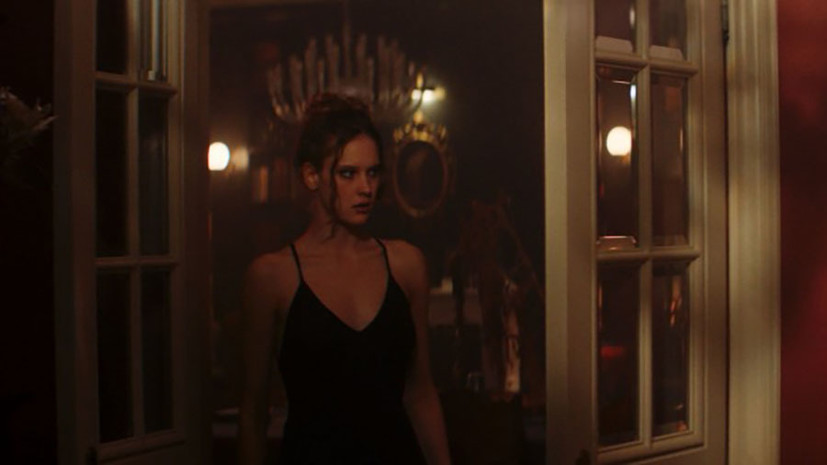At the Moscow International Film Festival, the dramatic film "Secret Attraction" was shown in the "Russian Premieres" program. The director was 25-year-old actress Stasya Venkova, who could be remembered by a wide audience for her roles in the projects "Outpost", "Clipmakers" and "Grozny". The new film is her first full-length directorial work. Venkova was the author of the idea of the tape and worked on the script together with Anna Ovcharova ("Three").
The key roles were played by Maria Yanycheva ("Karamora"), Mindaugas Papinigis ("Sobibor"), Anton Rogachev ("The End of the World") and Daria Balabanova ("Karamora"). Also in the tape appeared Rosa Khairullina and Nike Borzov. The producer was the head of the center "VGIK-Debut" Fyodor Popov.
The main character of the film is a young actress Veta. She is engaged in drama school, preparing for the production of "Anna Karenina" and lives by art. Unlike her peers who dream of "little things", Veta sets herself a global goal - to do "something great". It is she (and quite a bit - the case) that leads the girl to cooperate with Roman, a theater director who came from Poland on an exchange. Seeing in him the same person of art as her, Veta gets a chance to realize her idea, shares it with a new acquaintance and begins to rehearse a future solo performance with him.
Maria Yanycheva is stunningly convincing in her image. She fully managed to convey all the inspiration, creative passion and at the same time - the inner drama of her heroine. As the artists noted at a press conference after the screening of the film, in many ways they played themselves - young actors burning with their profession, which clearly benefited the picture.
Papinigis, who played Roman Mindaugas, also did a great deal of acting, but at first the choice of the artist for this role seems completely incomprehensible: in makeup, catchy outfits, with vulgar earrings in his ears and pretentious speeches about God, he does not look at all like a refined creator, whom he certainly considers himself, and seems slippery and fake. However, over time, this image becomes more justified, and in the end everything falls into place.
The chemistry between the main characters is very carefully shown. And this is the merit of not only the actors, but also the director: almost all the interaction of Veta and Roman is presented through close-ups, in which the characters seem to be clamped. Such decisions emphasize the growing intensity of passions, and for a long time the couple's platonic relationship turns out to be much brighter and more emotional than Veta's completely boring romance with her lover Denis (Anton Rogachev).
The production is one of the most striking, but at the same time controversial aspects of the picture. There are a lot of beautiful, truly spectacular plans in the tape. All of them successfully work to create an atmosphere - mysterious, passionate and creative, but often do not carry any meaning. Sometimes it seems that this or that frame or even a scene is present in the film only because it turned out beautiful or at least funny.
The feeling of falsehood that arises while watching the film is associated not only with the hero of Papinigis, it persists throughout almost the entire hour and a half of the tape. And sometimes it is difficult to understand where the lie ends and the truth begins.
So, the film opens with a scene of a lesson in a theater studio, where the artists do exercises that are strange for the viewer who is not immersed in the environment. They seem funny and do not leave a feeling of deep creative work, at least in contrast to the rehearsals of Veta and Roman - more thoughtful and serious. But later, even there, everything turns out to be not as beautiful as it was originally seen: the director is not so brilliant, and in their relationship there is a place for lies and betrayal.
And the main goal of the main character - to do "something great" - turns out to be false: in fact, she dreams of achieving the love of her father, who left the family and inflicted serious trauma on his daughter. However, this drama is somewhat blown away when the father appears, quite friendly towards his daughter and ready to communicate and help.
All this multi-layered meanings are embellished by the heroine's clear and again meaningless statement that she does not smoke, after which Veta appears with a cigarette in almost every frame.
It is quite difficult to say unequivocally what exactly the author wanted to say, but it is obvious that all the problems raised and personal dramas are presented on the screen through the prism of youthful maximalism, and not just a young heroine, but also a creative, emotional personality. And only after accepting all the challenges and dealing with external difficulties, the heroine gets the opportunity to defeat the internal drama, and then finally find her way.

